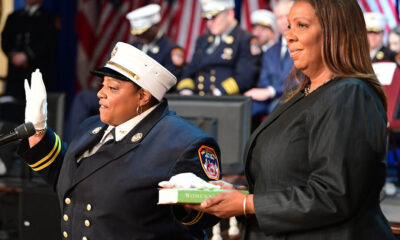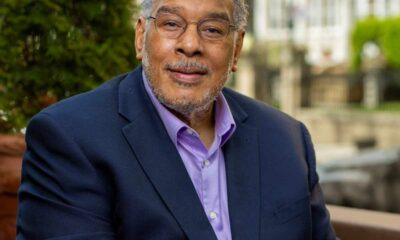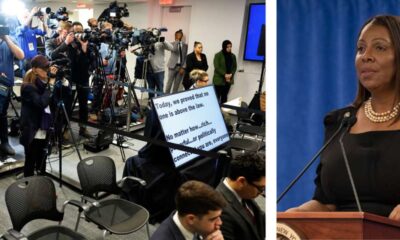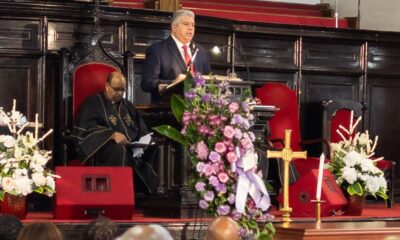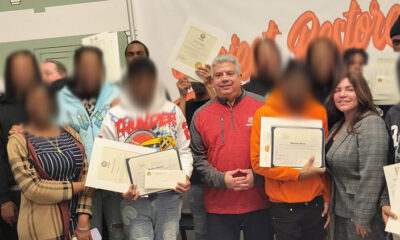Events
Brooklyn History-Makers of Our Time
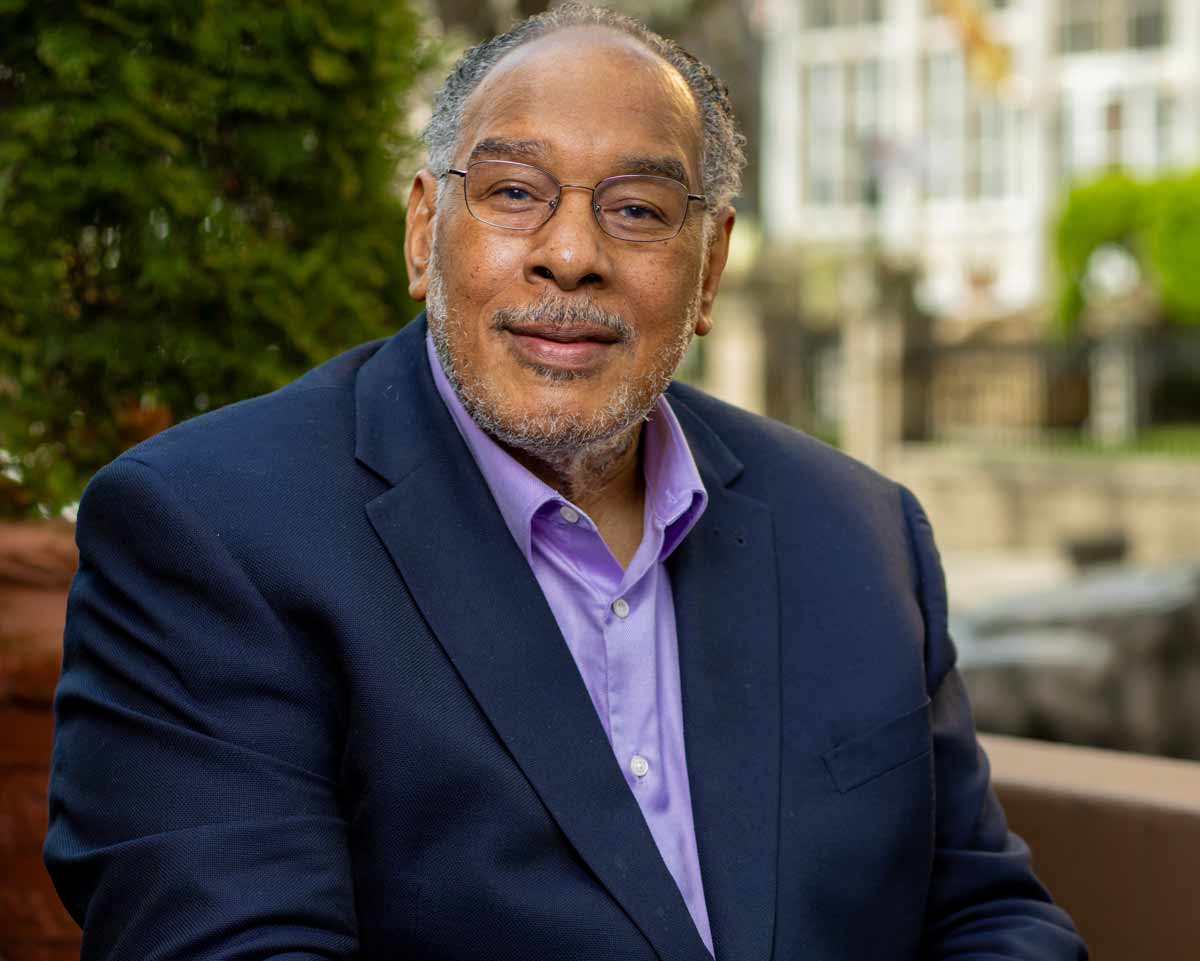
During the homegoing services of Dr. John Flateau* on January 10, 2024 at Bridge Street AME Church, New York City leaders honored the legacy of the visionary leader who influenced their lives, their work, his community and the State of New York. Dr. Flateau dedicated his life to public service and assuring all New Yorkers were fairly represented in government. He was a former commissioner of NewYork State’s Independent Redistricting Commission.
Part I of II
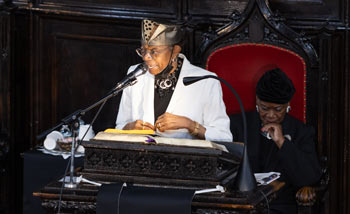
Hon. Velmanette Montgomery, Ret. Former New York State
Senator (District 25)
“He Moved Us Forward, Showed us how to Fight”
This is really more than a loss of a person. It is the moving on of an era. We will certainly miss him as a friend, as a colleague, and as a person who has been so instrumental in so many of us being here with you as elected officials today.
When I think of John, I try to think of little things that are of particular meaning to me in my relationship with him. There were two points in our politics that I want to mention. One was the year that we unfortunately had the experience of Al Vann being thrown off the ballot. Frank (Seddio), do you remember?
It was a crisis in Black Politics because we had lost our leader possibly, potentially. But it was John Flateau who organized and corralled all of us. Annette (Robinson), where are you? Do you remember?
To get out in the street, to be organized, to be consistent, persistent. He created little cards for us to give out saying to people, “this is about the man, not the party”, and he taught people how to move over to the last part of the ballot and vote for Al Vann first. That was the first time that Black Brooklyn elected someone who was not on the Democratic line, but someone on a minor party line, and we got Al Vann elected anyway. Isn’t that beautiful? That’s history being made while we work. Because we forget history. We think that it’s way in the past, but this man was a young guy who was committed and dedicated to moving us forward politically.
The next time we had a crisis, we needed to have the liberal line in order to elect, at that time, her first City Council run. Tish James. Tish James didn’t have a line. She was not on the Democratic line. She was on the Liberal line, on the Working Family party line. We went to the working family party and said, “We need your line for Tish.” She was the first person to be elected to the city council on a line other than the Democratic line. Tish James. That’s history, our history in Brooklyn. Who was part of that? John Flateau. Because he could organize. He could look at the numbers. He could tell us where to go. He could tell us how to do it. He understood the process. That’s so important. We didn’t have a press conference about it. We had a meeting about it, and John would say, “This is what we need you to do. So, get out there and do it.” That’s what we did.
It is so important to have a leader who is a good follower, who is a good visionary, who understands the process, who is going to give you the possible when it looks like impossible. That’s who John Flateau was. That’s what he means to us. And when I think of him, it’s the passing of an era, because we were not afraid in those days.
We did not shrink from obstacles. We confronted them. We understood the system. We knew the connection between politics and policy and that it was important to us in moving forward. We didn’t get here just because we had parties. We got here because it was hard work, it was determination, it was vision and it was people.
I see Esmeralda is here. Esmeralda is history. Thank you, Esmeralda. Esmeralda Simmons. We can say thank you everybody.
I just want to say thank you. Condolences to the family but thank you, thank God I am part of this opportunity to have lived and seen and been partnered with John Flateau. He is part of, not only my history, but he is part of the history of the people in this borough, in this state, both black and brown all across the state, because what he represented to us, to show us how to fight for the districts so that we could be here. That was him. That was Esmeralda. That was the Reverend Herbert Daughtry. The first bus to take us to Albany was sponsored by Reverend Daughtry.
We’ve been doing this a long time. I thank John Flateau for being one of us, who was committed, not for the money, because I just remember Al Vann begging for money for us to pay the rent on the office. It wasn’t about the money. It was about our future — all of the young people that I see here. I’m just so proud of them, but I want them to understand and to know, we still have a long way to go. Our people still depend on you. I depend on you now.
So, don’t leave us without vision, without passion and without understanding people like John Flateau. History is very, very significant. Don’t forget your history. Thank you and God bless you. Rest in peace and power to John. Thank you so much. Thank you. Thank you. Thank you.
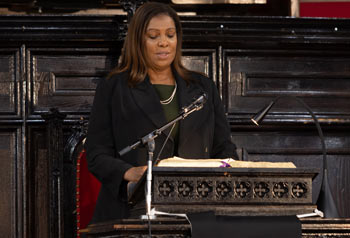
Letitia James, Attorney General of New York State
“Data was his Weapon”
I and some elected officials who are here this morning are direct beneficiaries of the brilliance of Dr. John Flateau. My political views were informed and shaped by his vast body of work. His analytical and data-driven approaches to complex issues were building blocks for Brooklyn and the city. He framed issues based upon his lived experiences, and government, and private information. Data was his weapon. Strengthening voting rights, data. Expanding political representation, data. Reforming the prison industrial complex, data. Changing educational outcomes, data. Eliminating housing discrimination, data. Addressing economic disparities, data. Stopping police abuses, data.
I’ve heard from so many elected officials this past week who recall his workshops and orientation on issues and policies, and practices that impacted black Brooklyn and this city. His legacy will forever be studied by the next generation of leaders. Leaders who will read with rigor The Prison Industrial Complex, Race, Crime and Justice in New York, Author, John Flateau; Black Brooklyn, The Politics of Ethnicity, Class and Gender, Author, John Flateau; Young Lives, American Dreams, African Americans and Caribbean Youth in Brooklyn, Author, John Flateau, and so many lessons in journals and essays, too many to mention.
He was a member of the intellectual elite, but somehow, he maintained that common touch. You see Dr. Flateau was committed to a more inclusive and representative Democracy. If we are going to honor his legacy, each one of us must ensure that his body of work was not researched in vain. We must fight against efforts to stymie voting rights and restrict access to the franchise, efforts to undermine diversity, inclusion and equity; efforts to eliminate opportunities in higher education, because Dr. Flateau … fostered an exchange of ideas and promoted civil discourse, and we, all of us must safeguard those rights in honor of Dr. John Flateau.
If we continue to analyze the data, we can correct the broken criminal justice system that grinds the hopes and dreams of black and brown people, and further, widens racial disparities. John would have wanted us not to stand idly by and allow anyone to subvert or restrain our voices and democracy, or limit our seats at the table of power. He would have wanted us to challenge those fearful of the color of change. Dr. Flateau refused to drink from the wine of the world. He was focused, deliberate, and simply authentically black.
If we can continue to say his name, and read his works, and fight for a more perfect union, then he will never die. We will continue to march on until victory is won. Rest on John, in peace and in power.
You brought us this far. Now, it’s up to all of us. Now, we release you to the ancestors. When you get there, say hello to Al Vann. Say hello to Major Owens. Say hello to Jitu Weusi. Say hello to our first black mayor, David Dinkins, because now the struggle John, is not in your hands. It’s in the hands of the leaders that you created, those who you molded, those who you mentored, and those who will now lead us forward. That, my friends, is our article of faith. With that, we will all cry out for justice. Rest in peace, John.
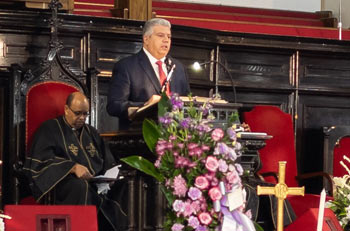
Eric Gonzalez, Brooklyn District Attorney
“He Uplifted Us to Positions of Power”
The collective of sorrow of the church — as people came in, paid respects, as we speak today about the man that Dr. Flateau was and what he meant to this community and what he meant to all of us in our individual capacities, it’s tremendous grief but it’s also a rejoicing of a life well-lived.
Dr. Flateau embodied what it meant to live a life of service. He was a keen reader of politics. He was the stalwart for justice and the champion for education. Dr. Flateau is rightfully recognized at this church as the giant of Bedford-Stuyvesant, of Central Brooklyn, of New York City. He touched on so many disciplines, all the disciplines that really mattered to make sure that black people, Latino people, people of color in this city got a fair shake. He never sought the spotlight for himself. He was a wise counsel. He was an inspiration. Today, we have so much of the leadership of our city and our state represented here in church to say thank you to the family for sharing your husband, your father, your brother.
He, as we now have learned, and sometimes it’s a generational thing but Council and Chief of Staff to David Dinkins, a brother and a fight to the Honorable Annette Robinson, the late great Al Vann, and to my mentor, DA Ken Thompson. When I ran for district attorney, John sought me out. I said he sought me out, and that was not by accident because he wanted to make sure that the path of justice in Brooklyn would stay strong. He understood what I was asking. My goal as district attorney was to make sure that we continue to restore trust in our law enforcement systems. That our community could never really feel safe, could never actually be safe if we didn’t trust our justice system.
When I turned to him for help, he helped create what I call the Safety Plan for Brooklyn. You see, when I became DA, I issued a report. It’s called Justice 2020 but really it laid out the goals of Dr. Flateau. What could the justice system look like if we centered fairness as the central focus point of that system? In that, we talked about the school to prison pipeline. How do we shut that valve? How do we prevent people from making money on the incarceration of black and brown people?
These were so central to the work, and as we continue to fight for a safer Brooklyn, it’s never been lost on me as District Attorney that we can never truly feel safe unless our justice system continues to fight and center people’s lives. The humanity in people’s lives are the core elements of what justice is really about. A sense of justice has to be that we’re going to be treated fairly. For me, Dr. Flateau was a mentor as well. He talked to me about how we move this system. Brooklyn has progressed, and I’m a son of Brooklyn. I grew up and was raised in Brooklyn. My family came from Puerto Rico to Bedford-Stuyvesant and to Williamsburg and I ultimately grew up in this New York in Brooklyn. I remember what Central Brooklyn was like when I attended school in Bedford-Stuyvesant, when I attended school in East New York and in Coney Island when I went to high school. We’ve made a lot of progress Brooklyn, but it was leadership like Dr. Flateau who uplifted so many of us to positions of power today.
I take this moment in front of all of you to say, as District Attorney, I recommit myself today and every day to that mission of Dr. Flateau about making the justice system work for all people. Very importantly, in the mission of Dr. Flateau was to bring black and brown communities together, because if we were going to really create a fair and equitable justice system, we had to speak to the values of our community. These values of justice and safety, that no child should ever lose a life to gun violence in our city is so on point. I recommit to this community today that we will continue to do the work together, and there’s a lot of partners in here. There’s a lot of partners in fighting gun violence where part of that fight is to do that with the community leading the way.
Once again, I offer my condolences personally, but I don’t think that everyone knew in the community how much Dr. Flateau touched lives. How many of you understood how — and I know that his sons mentioned that — his work is really being carried out at different areas: Medgar Evers College, Attorney General Tish James office and the work she’s doing in fighting for redistricting and all of the work that we have been doing locally in our justice system.
And that it is his thinking, his teaching, his motivation, his lessons that continue to push forward this city. So, thank you family, thank you all of you who feel that emotion. Know that the work continues, and as your DA here in Brooklyn, I pledge that we’re going to continue to move our city in a fairer direction and we’re going to continue to make the lives of Brooklyn residents safer. Thank you, church.
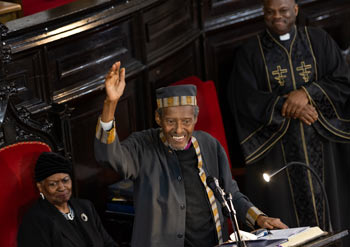
The Rev. Dr. Herbert D. Daughtry
National Presiding Minister
The House of the Lord Churches & Civil Rights Activist
“Priceless. He Made a Difference”
All of the speakers were eloquent and persuasive, touched on many, many aspects of John’s life. I’m thinking what can I add? What is there that has not been said? Therefore, I wouldn’t feel so guilty about taxing you for more time.
There was a gang of four, they called us Al Vann, Jitu Weusi, Sam Pinn and myself. But let me tell you, there was really a gang of six; a female leader, Annette Robinson, and a male leader John Flateau. They were consultants. They were part of our regional organizing. We set out — and Velmanette Montgomery, thank you for taking us down the corridors of history. You were so gracious recognizing all of us.
It just seemed unthinkable that there could be so many people of African ancestry in Brooklyn and we were so powerless, at the time. I’m talking about 1976. Then, a young lad named Randy Evans was killed, shot in the head in 1976 November. The following year, the jury pretty much acquitted the officer who did this, and we built a movement. The four of us has been meeting for months, trying to think through and analyze this scene in Brooklyn, when this happened. We stepped forward with plans to how we were going to build a movement and out of the movement, we were going to build a power base.
We would meet at each of our homes and try to think it through. We built the movement. The next year, Arthur Miller, June 1978, was killed, choked to death. That further fueled the movement and the demand that there be unity. We built the Black United Front. John Flateau was the consultant to the Black United Front. He was the go-between between myself as the pastor at the time and Assemblyman Al Vann.
It was the English poet Lord Byron who wrote a poem called An Elm in the Churchyard and one stanza stands out in my mind, increasingly so as the years go by. He said, “What is the worst of woes that wait on age? To view each loved one blotted from life’s page, and be alone on earth, as I am now.” I sat and think of all of the strugglers who are gone, in particular Al Vann. My wife and I, Dr. Karen was with Al in the last days of his life, last day of his life. We talked, and Al said to me and my wife, “We made a difference, didn’t we?” Yeah, and I pointed to him and I said, “Yeah, man, you made a difference.” With tears in his eyes, he shook his head and got up enough strength to say, “No, we, we made a difference.”
I mention that because John made a difference. All the glowing tributes that we’ve heard and that we could go on. He made a difference. The many elected officials that you see here, Black in this power and black, but help me, a simple man who does not understand the complications of politics — how can we have so much power … and gentrification? Help me, somebody please after this is all over. But John, he made a difference. We made a difference in Brooklyn.
In his quiet way — and he was always straightforward, firm – (he would) never hesitate to say, “You missed the mark. You’ve come up short.” People who are not afraid to tell you the truth about yourself, they’re priceless. John would do that.
I was pleased to hear of the different political changes that have come about, but he was also a profound, deeply spiritual man. I knew, as we would have prayer together and confer with each other together. I could go on and add to the tributes but you know, I was thinking of another son of the Caribbean, Marcus Garvey, who said, “Look for me in the whirlwind.” I thought, “I don’t know that that would be appropriate for John, the whirlwind.” Maybe look for him in the quiet movement. In every classroom.
Look for him, yes, at Medgar Evers. I thought finally of a biblical story of a prophet that God had called to have a conversation. The wind blew and the hurricane came but the Bible says no, he was not there. When it became quiet, then God and the prophet Elijah had a conversation. John, quiet, yeah, but I know he could raise his voice too, but quietly and effectively.
We will miss him very much, John used to say, “I don’t want to die in shallow waters. I want to die in the deep. Take me out in the deep.” To the family, and to all of us, I’ll conclude with the quote (from Shakespeare’s play Hamlet), “may flights of Angels sing you to (your) rest.” And when John has landed at the great white throne, the Bible tells us, may he hear the Lord say, “Well-done thy good and faithful servant. You’ve been faithful over a few things. Now, enter into the joy of the Lord.”
So, we say with Apostle Paul, “John, you fought a good fight. You finished your course, and you kept the faith. Henceforth, there is laid up for you a crown of righteousness which the Lord, that righteous judge, shall give you on that day.”
If you be patient, I’ll be coming home soon.
(To be continued)
For information on the life of Dr. John Flateau, visit:
ibw21.org/news/remembering-the-life-of-dr-john-flateau
www.mec.cuny.edu/campus-news/dr-john-louis-flateau-beloved-professor-public-servant-political-strategist
All photos by Paul Hanley




